Iranian Markets Drop Amid Increased Regional Tensions
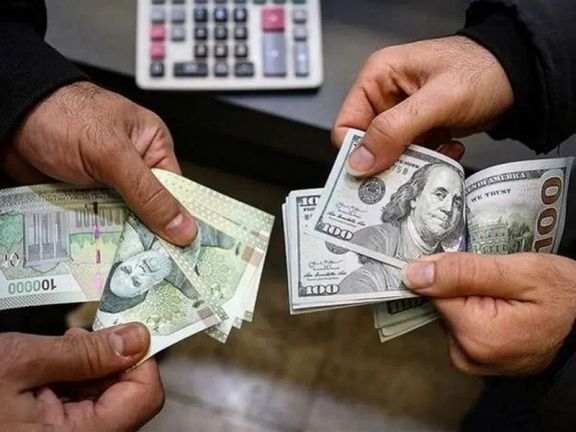
Iran’s currency and stock markets witnessed significant downward pressures on Saturday amid the continuing Gaza war and the specter of a widening conflict.

Iran’s currency and stock markets witnessed significant downward pressures on Saturday amid the continuing Gaza war and the specter of a widening conflict.
The escalation of tensions between Tehran and Washington, combined with the start of a new phase of the Israeli ground offensive in Gaza, can have significant negative effects on various aspects of Iran’s economy.
The US dollar climbed to 520,000 rials on Saturday, up from slightly over 500,000 rials during the week. The increase came after a sharp rise on the first day of the conflict between Hamas and Israel when the dollar reached 530,000 rials. However, intervention by the central bank and market stabilization measures led to a slight recovery for the rial.
Iran’s currency has declined by more than 12-fold since 2018 when the United States withdrew from the JCPOA nuclear deal and imposed economic sanctions.
In addition to the currency market, the prices of various gold coins and gold also experienced a significant surge on Saturday. Each gold coin was priced at over 300 million rials, equivalent to nearly 600 US dollars, marking an increase of more than ten million rials compared to the previous week.
The Tehran Stock Exchange's main index faced a decline of 50,000 units, losing over 2.5% of its value and falling below the 2-million-unit mark.
The economic developments come in the wake of a decrease in retail trade and the continuous outflow of real capital from the market which indicated signs of a looming recession.
However, Ehsan Khandouzi, the Minister of Economy, attributed the economic developments to foreign media reports.
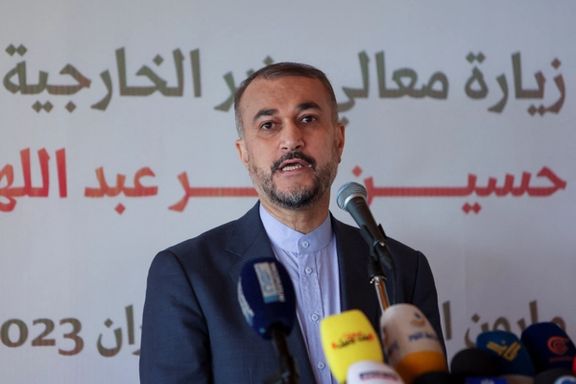
Iran's Foreign Minister, Hossein Amir-Abdollahian, has issued a warning regarding the US support for Israel, as military operations escalated in Gaza on Friday.
In an interview with Bloomberg Television from Iran's mission to the United Nations in New York this week, he expressed his concerns, saying, "The US is advising others to show self-restraint, but it has sided with Israel totally."
His statement has raised concerns about the potential escalation of the Israeli-Hamas conflict into a broader regional war. He refrained from specifying Iran's intended actions but refuted claims that Iran had directed groups in Syria and Iraq to target US forces. Instead, he placed blame on Washington for the escalation of violence following Hamas's attack on Israel.
His warning comes amid worries from Western officials that Iran-backed Hezbollah fighters in Lebanon might launch a series of attacks that could overwhelm Israeli air defenses. The US National Security Council has expressed its concerns to Israel regarding civilian casualties and collateral damage.
The situation remains highly sensitive, with Amir-Abdollahian warning, "Opening of new fronts will be unavoidable, and that will put Israel in a new situation that will make it regret its actions. This has reached the point of explosion, and anything is possible, and any new fronts can be opened up."
Iranian officials have continued to issue blistering statements on the Gaza conflict, but so far their main proxy force in the region, the Lebanese Hezbollah has not fully entered the conflict.
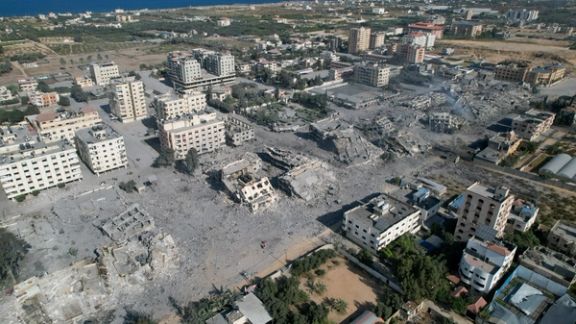
Iran continues to issue fiery statements, threatening escalation in the Gaza war, yet have not taken any concrete steps on the ground to underpin their claims.
Israel began a ground offensive into Gaza Friday night, first launching devastating air strikes. Defense Minister Yoav Gallant stated that the war against Hamas has entered a new phase, signaling the potential onset of the ground offensive.
Iran's Foreign Minister Hossein Amir-Abdollahian issued a warning regarding the United States' support for Israel during his visit to New York to attend a special session of the United Nations General Assembly. In an interview with Bloomberg Television from Iran's mission to the UN in New York, he warned, "The US is advising others to show self-restraint, but it has sided with Israel totally."
Amir-Abdollahian had set a very strict red line on October 15 regarding the Gaza ground offensive, warning that this would spiral the conflict and mutate into a regional war.
“If the Zionist entity [Israel] decides to enter Gaza, the resistance leaders will turn it into a graveyard of the occupation soldiers,” Hossein Amir-Abdollahian had told Al Jazeera.
A similar view was expressed by the IRGC Commander-In-Chief Major General Hossein Salami, who said that the Israeli army was not able to combat Hamas, stating: "The ground is the strength of Hamas, and if Hamas fights on the ground, Israelis will be swallowed up, and Gaza will serve as their burial ground."
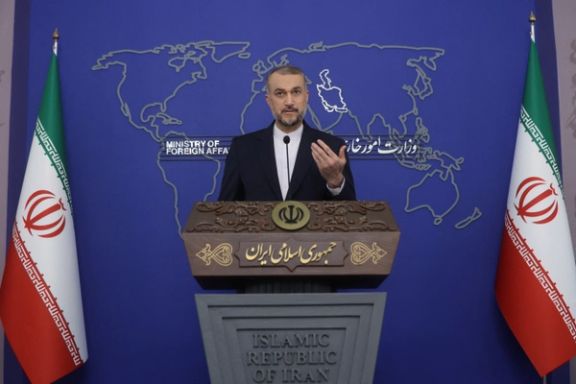
Meanwhile, the Gaza Strip continues to be bombarded by Israel's air force following an intensified attack last night that caused communication networks to go down. The Israel Defense Forces has announced the death of a senior leader behind the October 7 attack.
IDF has also issued a call for Gaza residents to evacuate prior to a wider operation in the north of the territory, saying that "the impending operation is set to neutralize the threat of Hamas with precision and intensity."
Iranian authorities had warned Israel that “unification of the fronts” would happen in case of a ground attack. Meaning that the so called “resistance front”, the alliance of Tehran’s proxy militias in the region would join forces against Israel.
Nonetheless, so far, the largest of those proxies, the Lebanese Hezbollah, has maintained a relatively low level of activity, causing Hamas officials to publicly voice their discontent.
On the surface it appears that Iran is taking a different approach, as Salman Zakir, member of Iran’s parliament for Urmia, called for a diplomatic solution rather than a military one to deal with the crisis in Gaza.
Iranian President's call with Qatar's Emir on Saturday is another indication of this strategy. In recent years, Iran and its proxies have relied heavily on Qatar as a mediator to negotiate with Western governments. The Qatari government has also been successful recently in negotiating the release of hostages on behalf of Hamas, which maintains its headquarters in Doha.
It appears that the metaphor analysts used to explain Israel's strategy against militants in the Gaza Strip, "mowing the grass," has ceased to be relevant since more than 1,400 civilians and hundreds of soldiers have been slaughtered by Hamas terrorists after the group's surprise attack on Israel.
It is possible that Israel has abandoned the use of patient deterrence in the region and is determined to actively eliminate militants. Consequently, they may not adhere to the principle of proportionate retaliation against Hezbollah. In an interview with Iran International, the Israeli UN ambassador Gilad Erdan had said: “The Ayatollah regime is the head of the octopus and Hamas is only one of its tentacles. Once we’re finished with this war, we will address this global threat that Iran poses."
In Washington's recent swift retaliation strike against Iran-linked sites in Syria following assaults on US CENTCOM forces in Syria and Iraq, Iran did not benefit from the usual tactic of no retaliation. Clearly, the United States supports Israel completely, and a full-scale war may not be in the best interest of Iran. Moreover, the regime's usual diversionary tactic may be ineffective in this case, at least at this point.

Shilan Mirzaee, a human rights and political activist, is in danger of being deported to Iran because of increased pressure on Iranian asylum seekers in Turkey.
Mirzaee was recently detained in Izmir and transferred to the Bandirma deportation center in northern Turkey.
During an audio message on Thursday, Ms Mirzaee described her situation and stated that if she were to be returned to Iran, she would be subjected to severe punishment.
Attempts to deport her are being made despite her claim that she has "the approval of the United Nations and the Immigration Police" in her file and that she has not engaged in any activities against the Turkish government.
Authorities have not explained why this activist was arrested and transferred to the detention center.
In recent years, the situation of Iranian political and civil refugees living in Turkey has deteriorated.
Shilan Mirzaee has described threats made by individuals associated with the Iranian Embassy, including two women who she alleges were attempting to kidnap her, and threats made against her son in front of school.
Iran International reported in August about the situation of an Iranian refugee in the Aydin Removal Center who was being physically and mentally tortured by the camp director.
He explained that the officials of the camp keep the asylum seekers under the sun so that they will sign the deportation papers to Iran.
Last year British television channel ITV reported that affiliates of the Iranian regime are threatening to kidnap political refugees in Turkey.
An asylum seeker was quoted asserting that Iran has become very adept at kidnapping and killing opponents.

Iran says the "unauthorized Starlink operations" within the country must stop and Elon Musk’s satellite internet company must secure licenses for its activities.
During a session concluding on Friday, the International Telecommunications Radio Regulations Board of the ministry of telecommunications identified Starlink's satellite internet services as being in “violation of international regulations.”
The move comes in the context of Iran's well-known strict internet control and censorship practices, characterized by thousands of websites being blocked since the early 2000s and most social media platforms banned. With the absence of independent media and heavy censorship, many Iranians mostly depend on social media for their source of political news and information.
Last year, the Iranian government issued a 10-day ultimatum to Meta Platforms, the parent company of WhatsApp Messenger and Instagram, demanding they establish offices within Iran to have their apps unblocked. The intention behind the ultimatum was to exert control over Meta Platforms' operations, although the demand was ultimately rejected by the company.
Following nationwide protests in Iran last year, the Iranian regime significantly curtailed internet access for its citizens. In response, the US government relaxed some of its sanctions on exporting internet services to Iran, allowing SpaceX to provide the Stralink satellite internet services in the country.
Elon Musk, the owner of both SpaceX and the Starlink, recently revealed that the Iranian regime expressed dissatisfaction with the introduction of Starlink internet services within the country. He noted that the satellites were introduced discreetly during widespread internet shutdowns. Musk shared a letter from Iranian leadership during a meeting with the Israeli Prime Minister Benjamin Netanyahu in California.
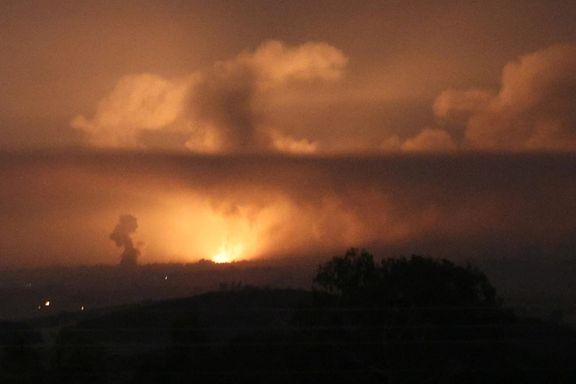
Signs on the ground in Gaza on Saturday morning indicated the commencement of a long-anticipated Israeli ground operation following hours of heavy air attacks.
Some said Gaza looked like hell on earth, with huge flames resembling volcanic eruptions Friday night into Saturday morning.
Israel said on Saturday morning its troops, sent in on Friday night, were still in the field, without elaborating. The country had earlier made only brief sorties into Gaza during three weeks of bombardment to root out Hamas militants, who killed 1,400 Israelis, mostly civilians, in a terror raid on October 7.
Israelis say their air force is striking tunnels dug by Hamas and Islamic Jihad to store rockets, weapons and use as springboards for attacks.
Early Saturday, a few hours after Israel confirmed the expansion of its military operation in Gaza, Hamas announced it is ready to fight the Israelis with "full force."
"Netanyahu and his defeated army will not be able to achieve any military victory," read Hamas’ statement.
On Friday night, the armed wing of Hamas reported confrontations between its fighters and Israeli troops in Gaza's northeastern town of Beit Hanoun and the central region of Al-Bureij.
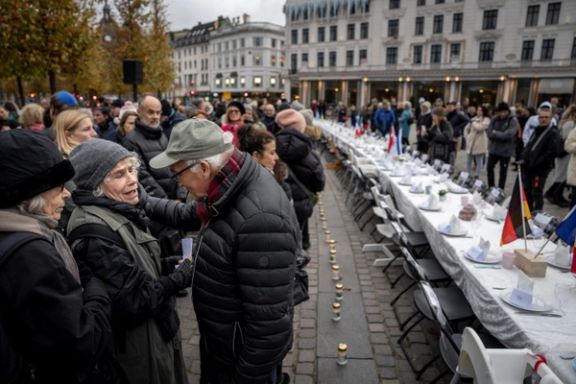
"Al-Qassam Brigades and all Palestinian resistance forces are fully prepared to confront the aggression with full force and thwart the incursions," Hamas said.
As Israel’s bombardment of Gaza intensifies, the head of the UN agency for Palestinian refugees has warned that “many more will die” from shortages.
“People in Gaza are dying… not only from bombs and strikes, soon many more will die from the consequences of [the] siege,” Philippe Lazzarini, the UNRWA chief, said.
There’s been unconfirmed reports of explosions near Gaza’s main hospital. Israelis claim Hamas uses the hospital as a shield for its underground command center –an allegation the Palestinian side has flatly rejected.
Hamas is backed by Iran, which also supports proxy militias in Lebanon, Syria, Iraq and Yemen. The Israeli military said it had stopped a missile fired from Lebanon at one of its drones and was striking the launch site, the latest in what have been the most serious clashes on the border since 2006.
As humanitarian concerns increase, international institutions are calling for de-escalation and a halt on attacks to allow them to help civilians trapped in the densely populated enclave.
The UN’s general assembly passed a resolution to that effect Friday evening. The initiative by Arab states passed with 120 votes in favor, 45 abstains and 14 against, including Israel and the US.
Israeli officials say there would be no let off in military operations or the siege on Gaza strip until they ‘root out’ Hamas.
The Biden administration has maintained all along that Israel has a right to self defense and should be supported not stopped in its relentless attack on Gaza.
Israeli airstrikes have killed at least 7,000 in Gaza, according to Palestinian officials, who have published a long list of all casualties with their personal details for verification.
Getting information from Gaza has become all but impossible, since Israel cut internet and phone networks coinciding with its expanded operation.
International organizations say they can no longer function or even reach staff in Gaza. Lynn Hastings, an official from the UN’s Office for the Coordination of Humanitarian Affairs (OCHA), said that UN hospitals and humanitarian operations “can’t continue without communications”.
Gaza has been in darkness for more than two weeks. The Israeli government cut off electricity after Hamas militants attacked Israel (October 7), killing more than 1,400 and taking more 200 hostages.
Now the blackout seems to have extended to communications.